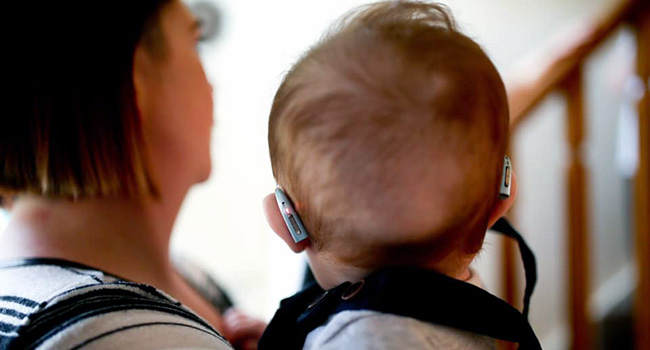
A new approach to increasing hearing aid use in the early years
Babies embark on a remarkable language-learning journey from the moment they are born, with many major developments happening before they even say their first words. This means that the first couple of years of a baby’s life are an important time for building strong foundations in language development. These foundations are especially important as they are related to later-life outcomes such as academic achievement and mental health. For the majority of deaf babies (that is, babies with any degree of hearing loss), their language learning journey can be harder. This is because most are from hearing families so will be learning a spoken language (even when families also incorporate a sign language), and any degree of hearing loss limits access to speech sounds, which is crucial for spoken language development.
Hearing aids are a key part of helping babies learn spoken language because they increase access to speech sounds, and by getting hearing aids as early as possible and then using them all the time, babies are more likely to have better language outcomes. Thanks to newborn hearing screening, hearing aids can be fitted from as early as 4 weeks old, but we know from research here at ManCAD (and by others around the world) that babies aren’t using their hearing aids as often as they need to because incorporating them into daily life can be a challenge for families.
What are ManCAD doing to support families?
At the moment, there are very few evidence-based programmes of support to help families increase hearing aid use with their baby, and it is unclear how successful those that do exist can be because – although carefully developed – they are not based on a scientific understanding of human behaviour. Bringing together ManCAD’s expertise in Audiology and Deaf Education, as well from behavioural science, the CHerUB project (Caring for Hearing aid Use in Babies) is taking a new approach by developing support for families within the scientific theory known as ‘behaviour change theory’. To change a behaviour (like increasing hearing aid use with babies), there are a number of things or ‘drivers’ behind our ability to make that change. For example, whether we have the knowledge and/or skills to reach the goal or whether our environment makes the goal possible, such as social support or having the right equipment, or whether we believe we can reach that goal or if difficult emotions get in the way. So, we need to understand all the things that make it easier or harder for families to use hearing aids with their baby to be able to identify which ‘drivers’ we need to focus on to help families reach consistent hearing aid use, which is what we’ve been doing.
We now know that there are a number of ‘drivers’ we need to focus on including environmental context challenges such as keeping the hearing aids on during child activity, and beliefs about the benefits of hearing aids. For example, for families of a child who responds to sounds without their hearing aids, it can be hard to see the need to use them all the time, especially when it’s not easy to understand the ins and outs of their child’s hearing loss and what hearing aids can do to help speech development. Following a behaviour change theory framework, we can now use our new understanding to map out strategies that are best suited to tackling these difficulties and work closely with families and the professionals who support families with hearing aid use (Qualified Teachers of the Deaf, Audiologists, Educational Audiologists) to develop support that we hope will help families overcome challenges and reach consistent hearing aid use with their child.
Interested in finding out more?
You can find out more about our National Deaf Children’s Society funded project on the CHerUB project (Caring for Hearing aid Use in Babies) where you can also sign up to our mailing list for project updates. If you have any comments you’d like to share, questions you’d like to ask, or if you’d like to get involved in the CHerUB project, we’d love to hear from you! You can get in touch via our website or contact me (Ciara Kelly) directly.
If you’re interested in working within Deaf Education , you can find out more about ManCAD’s postgraduate training.





0 Comments